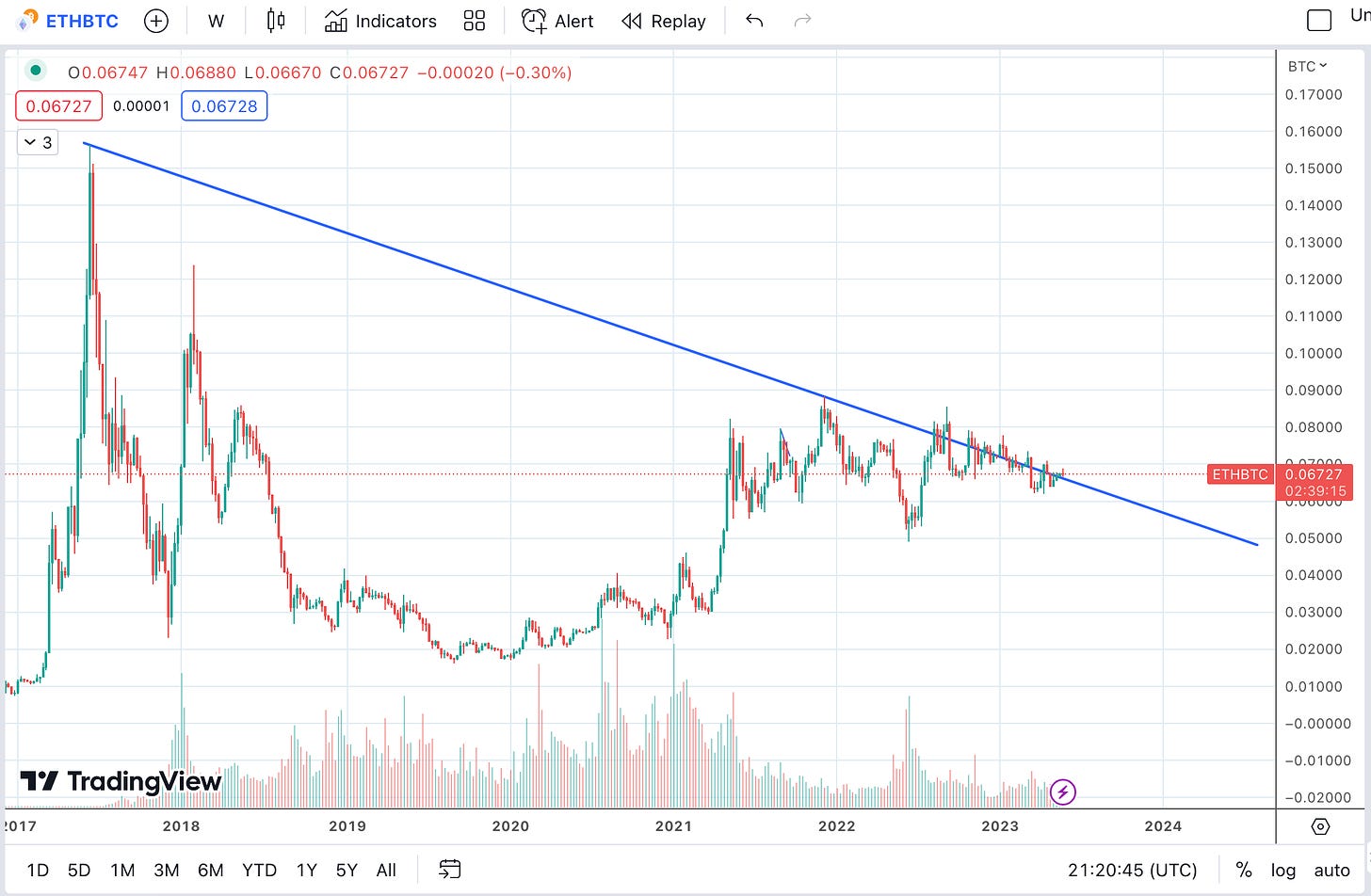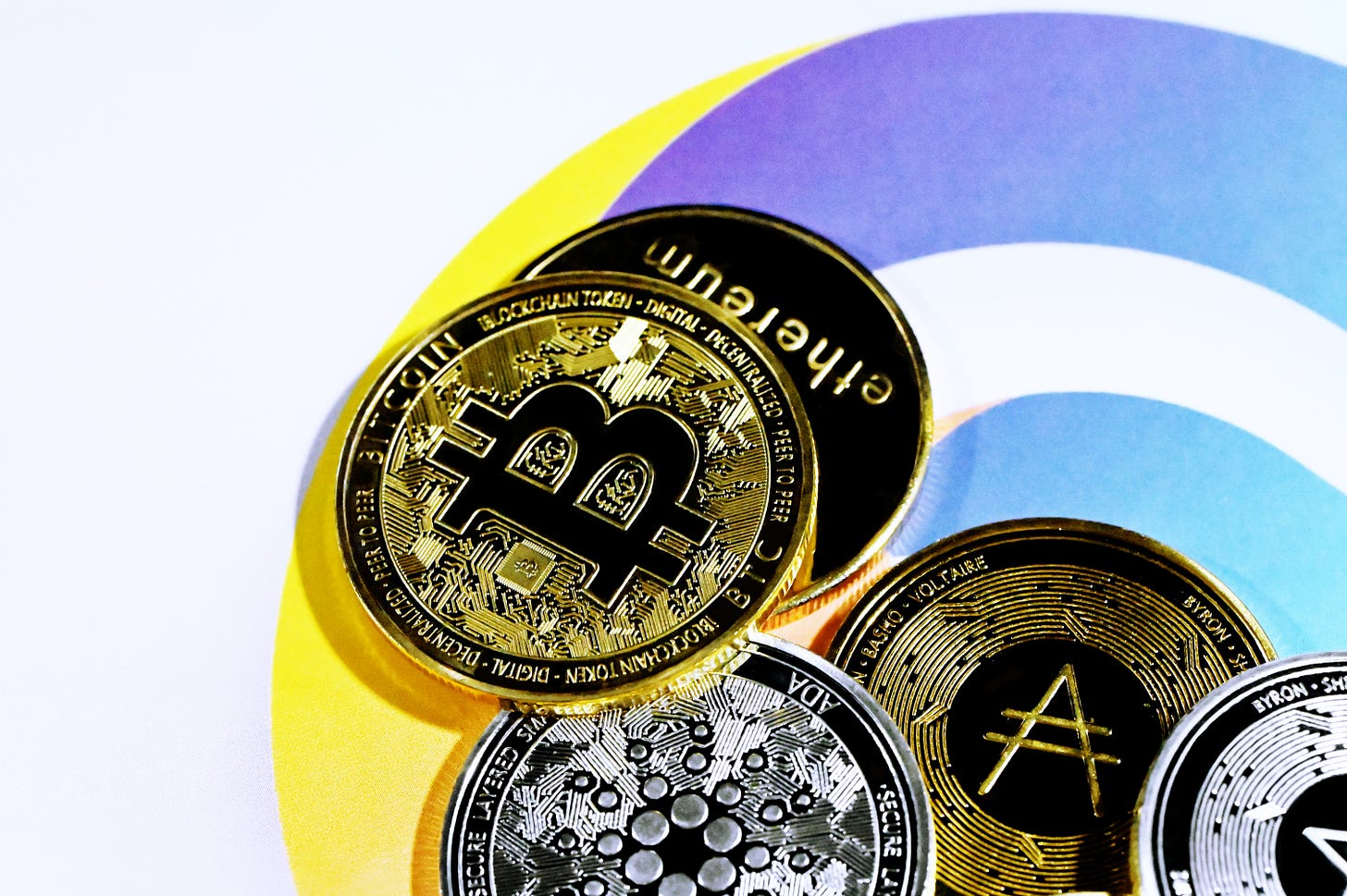
If you’ve been reading this newsletter for the last few weeks, you may have noticed that I’ve begun using the term “Bitcoin/crypto” instead of just “cryptocurrencies,” “crypto” or “digital assets”.
I’ve begun doing this as a means to distinguish bitcoin (BTC) from all other digital assets.
Some in the Bitcoin space will go as far as saying that “Bitcoin isn’t crypto,” and while I understand the point their making, they’re technically incorrect.
Bitcoin is absolutely a crypto asset. Please make no mistake about that.
But it has unique features that put it in a class by itself among all other crypto assets.
If you’d like to learn about those unique features in-depth, I highly suggest reading the following report from Fidelity: “Bitcoin first: Why investors need to consider bitcoin separately from other digital assets”
Here are some key points from the paper:
Bitcoin is best understood as a monetary good and a store of value in an increasingly digital world.
Bitcoin is fundamentally different from all other digital assets; no other digital asset is likely to improve upon bitcoin as a monetary good.
Non-bitcoin projects should be evaluated from a different perspective than bitcoin.
And while I hesitated to share a traditional financial institution’s take on Bitcoin/crypto, I do have to say that I back Fidelity as far as its approach to Bitcoin/crypto.
The institution got into the space in 2014, and its current CEO, Abigail Johnson, is a massive Bitcoin/crypto advocate.
I shared some thoughts on how rad Johnson is in the following article: “Fidelity CEO Brings Crypto Some Solace (The Street)”
Anyway, the two features of Bitcoin that I consider most important are its proof of work (PoW) consensus mechanism and the fact that the supply of BTC is finite, set at 21 million.
If you’d like to learn more about what PoW is, I touch on it in this piece: “Layer 1 and Layer 2 blockchain scaling solutions” (Finder)
The Bitcoin network is protected by the immense amount of computing power it takes to mine BTC and secure the Bitcoin network. I know that the amount of power that Bitcoin uses is often critiqued in the MSM, but, generally speaking, I don’t subscribe to the idea that we should be reducing the amount of power we use as a species.
Instead, we should be developing cheaper, more environmentally-friendly sources of power. Historically, human flourishing has been linked to energy consumption, and I’m not looking to go back to living in the dark ages — both literally and metaphorically.
(And for anyone wondering, yes, I believe climate change is real and that it’s caused in large part by human beings. Again, though, I believe the solution is to find cheaper, renewable sources of power, not reduce the amount of power we use.)
Bitcoin’s supply being finite makes it a perfect pricing mechanism. And I subscribe to Jeff Booth’s notion that everything is falling in price against bitcoin (BTC) — forever.
(I highly recommend your trying to wrap your head around what Booth has to say in the following interview.)
It may not seem like all prices are falling against bitcoin in the short term, but I do believe this will be the case in the long term.

So, to sum this section up, bitcoin (BTC) is unique in that 1.) it’s protected by computing power, not a board of human beings or human validators and 2.) it’s supply is perfectly finite.
I went into these points as well as others in a bit more detail in the following piece: “Bitcoin Is a Store of Values” (Nasdaq)
Ethereum
Now, I’d also like to say that I’m not a Bitcoin maximalist — or someone who believes that Bitcoin is the only cryptocurrency worth investing in and/or caring about.
I hold some small amounts of other crypto assets, as well.
For example, I hold some Ethereum (ETH), despite the fact that I have my reservations about its consensus mechanism changing from PoW to proof of stake (PoS) (see the “Layer 1 and Layer 2…” piece I linked to above to lean more about PoS).
I shared some of my reservations in this article: “The Ethereum Merge: Is it actually a good idea? 3 experts weigh in” (Finder)
From a technological perspective, Ethereum is an absolutely incredible platform. I’ve studied it at length and am in awe of so much what’s been created on it.
However, the native asset of Ethereum — ether (ETH) — is not money, despite the fact that some in the Ethereum community refer to it as ultra sound money.
And some big names in the crypto space would back me up on that:
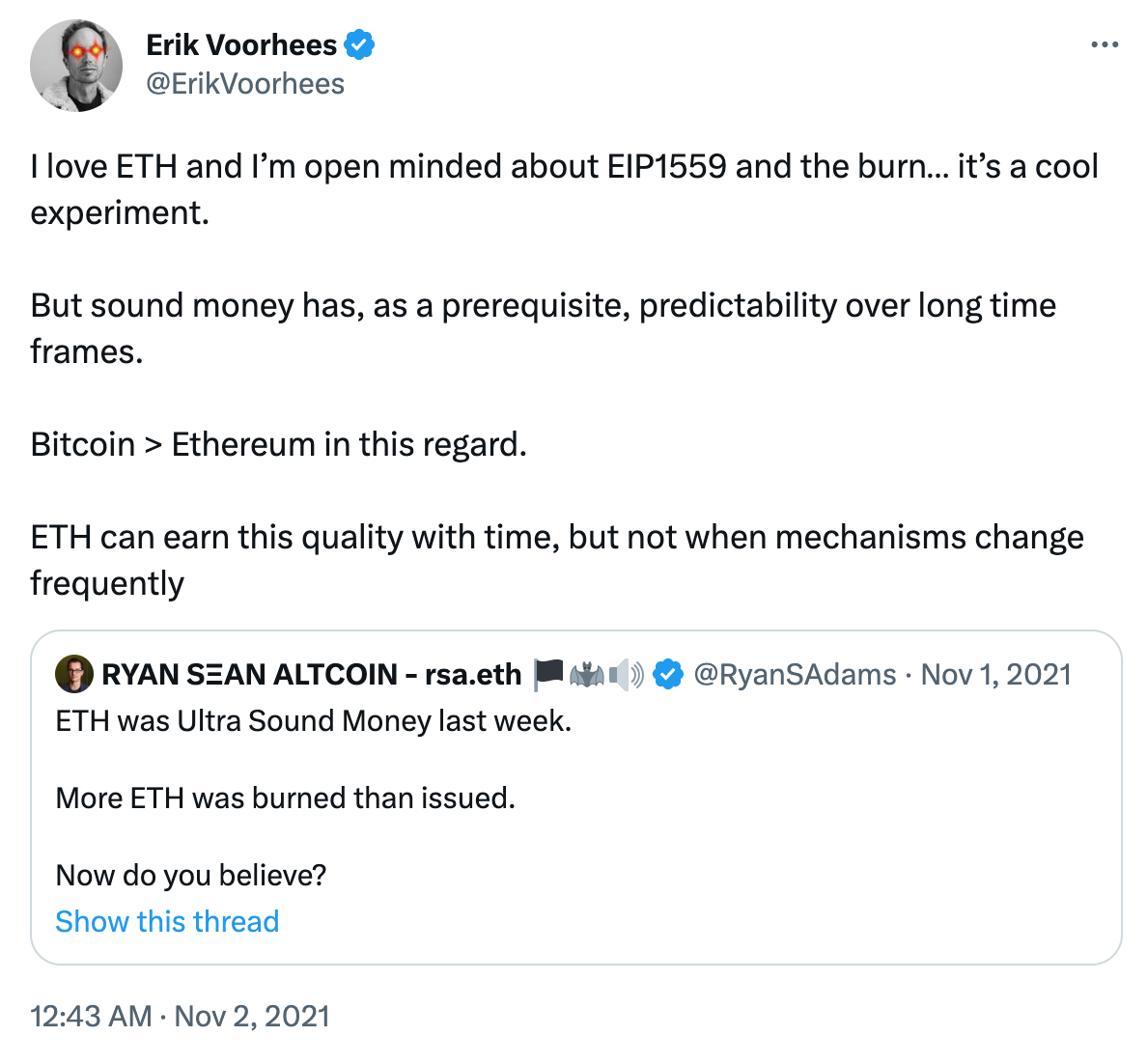
“Crypto people that root against Bitcoin don’t understand money. Bitcoin people that root against Ethereum don’t understand tech.” -Ryan Selkis, CEO of Messari (from a now deleted tweet posted on March 18, 2023)
With that said, I think it’s intellectually dishonest of Bitcoin maximalists to dismiss Ethereum as a network, because there’s a lot to learn from what’s been built on it.
I recently spoke with a Bitcoin maxi venture capitalist who admitted that so much of what’s been built on Ethereum is cool and that he believes similar things will be built on second or third layers of Bitcoin one day.
I agree with him. I think that decentralized applications (dapps) similar to UniSwap, OpenSea and MakerDAO are cool and may come to layers of tech built on top of Bitcoin one day. But not acknowledging that these technologies were built on Ethereum first is, again, intellectually dishonest.
However, it was Nik Bhatia (check out my interview with him below!)…
…who first brought to my attention that the price of ether (ETH) has been in a downtrend vs. the price of BTC since late 2017.
ETH vs. BTC
I can’t unsee this now.
You can even see how ETH has continued to get rejected as it’s tried to break out of its downtrend vs. BTC since late 2022.
Now, this doesn’t mean that ETH won’t break out of this downtrend at some point. That could absolutely happen.
Also, this doesn’t mean that ETH won’t rise to new all-time price highs vs. the USD or other fiat currencies again. It simply means that, compared to the price of BTC, it may continue to fall in price.
This would again fall in line with what Jeff Booth says: “Everything is falling in price against BTC — forever.”
All Other Crypto Assets
The vast majority of crypto assets are something of a cross between scams and hot garbage.

That being said, there are some cool use cases for some certain crypto networks (e.g., buying NFTs on Ethereum, using Monero for private transactions or sending stablecoins on networks on like Tron that facilitate cheap transactions.)
But keep in mind that while these use cases are cool, these networks are far more vulnerable to state or institutional attacks than Bitcoin is.
By my estimations, even for a network as big as Ethereum, it would only cost about $100 billion for a state or institution to successfully attack the network. Given that the US now spends approximately $250 billion per quarter servicing it’s debt, $100 billion isn’t that much money.
It would cost even less for a state or institution to attack crypto networks smaller than Ethereum.
I’m Here for the Money
The reason over 90% of my allocation to crypto assets is to bitcoin (BTC) is because I believe the world needs a hard, digital version of money that can’t be censored.
I think this will become more and and more important as more and more fiat currencies fail. The world will need a safe-haven currency, and, IMO, it will be bitcoin (BTC).
Also, like Jesse Powell, the founder of the crypto exchange Kraken, I believe that there’s a humanitarian dimension to holding BTC.
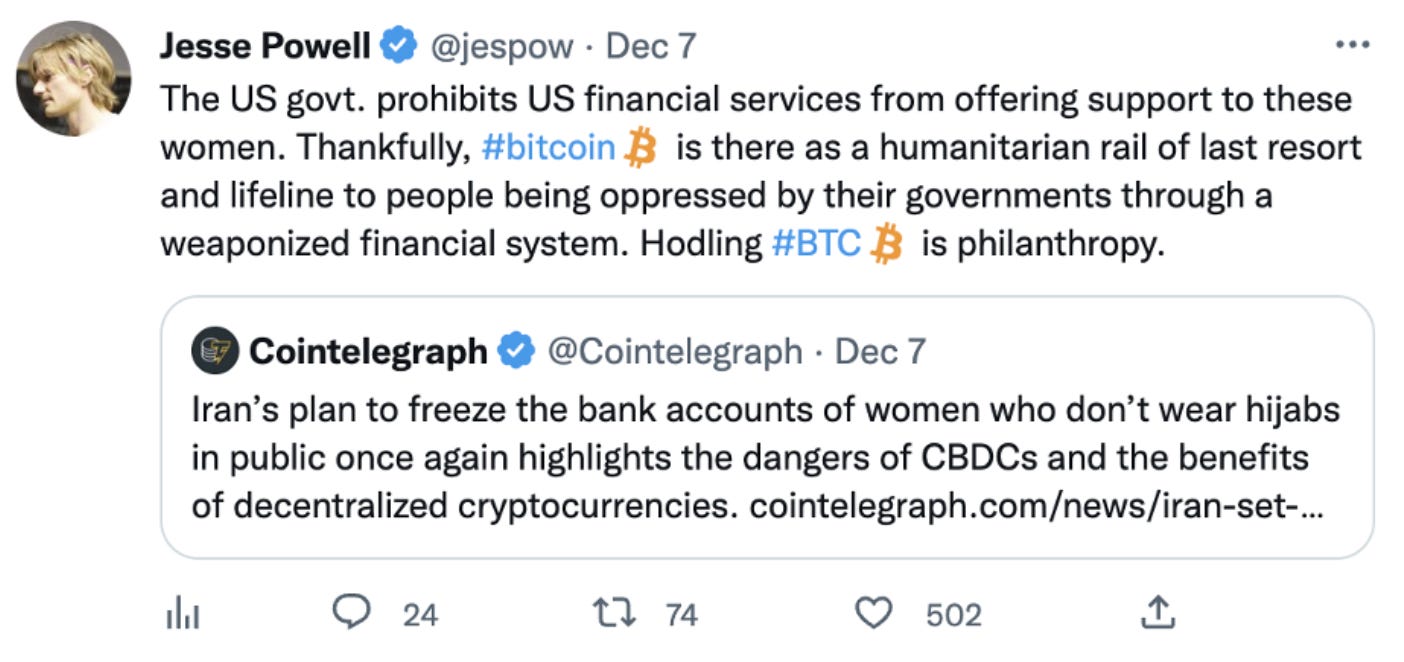
I like knowing that my holding BTC helps to set a price floor for those who might need the asset to retain value most.
I feel a solidarity with those around the globe who are trying to use Bitcoin to better their lives.
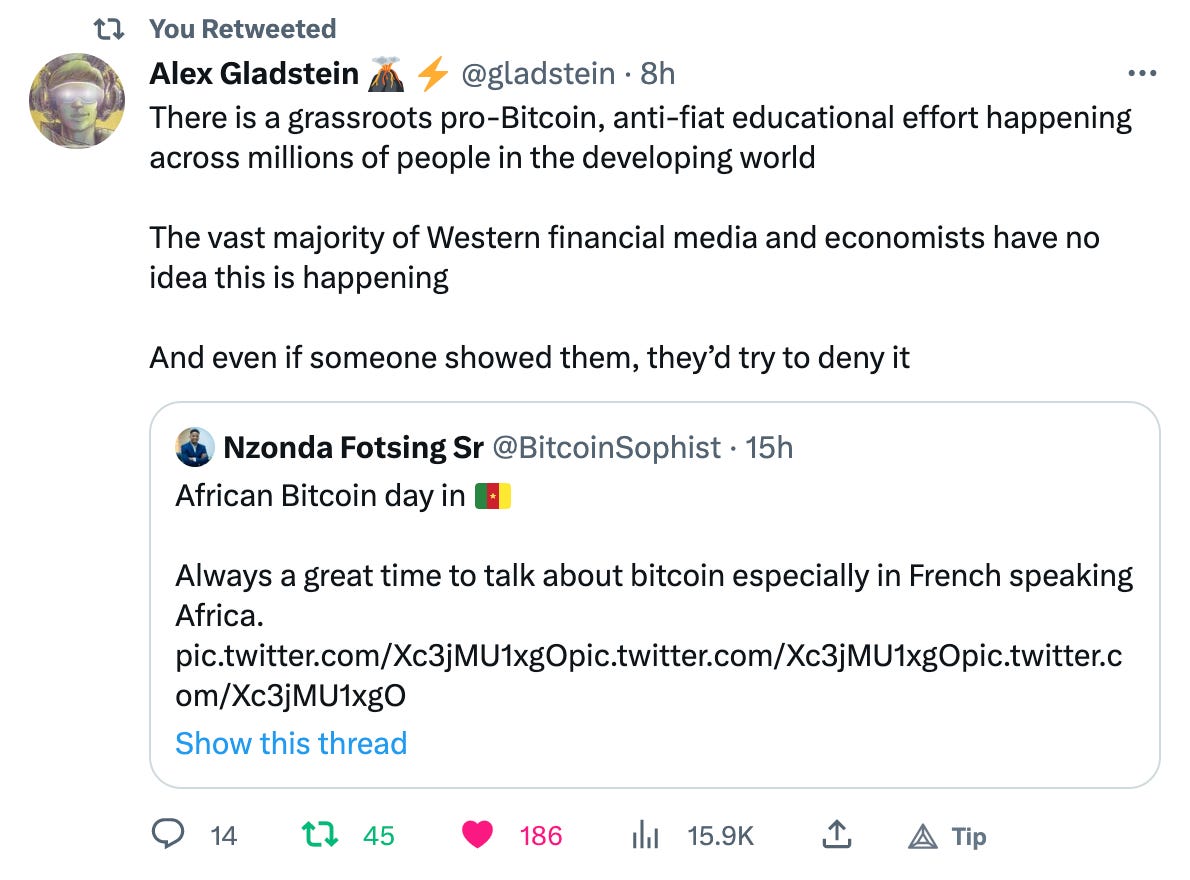
But that’s just me.
There are others in the crypto space who aren’t just here for the hard money and who are more technology-minded (not that Bitcoin isn’t a brilliant technology). Some of these types like to express themselves as developers or community members of Ethereum or other smart contract platforms.
For example, an ex-co-worker of mine now writes smart contracts for Solana. He also lives in Eastern Europe, where, if I had to guess, decent paying jobs aren’t as prevalent as they are here in New York.
I’m happy he has the option to make a living working on Solana. While it’s surely not my favorite blockchain, it serves a purpose for someone somewhere right now, and I’m more than okay with that.
And I’m also more than okay with someone who’s all about Ethereum or any other blockchain with whose members they feel a sense of solidarity.
People should be free to invest there money wherever they like, and ultimately, the market will determine which blockchains will remain relevant and which will fade away.
The Takeaway
I use the term “Bitcoin/crypto” to illustrate that Bitcoin (BTC) is different from other crypto networks and assets. BTC is the only crypto asset that I’d actually consider money in the real world.
This doesn’t mean that I think all other crypto assets have no value. However, I do subscribe to the idea that everything in the world may just may be falling in price compared to bitcoin on a long enough time horizon.
Happy Memorial Day to those in the U.S., and thank you to all who have served!
Happy Monday to everyone else around the world!
Big love and take it ease.
Best,
Frank
Twitter | LinkedIn | YouTube | MuckRack | Finder | QWOTED
Just listened to:





